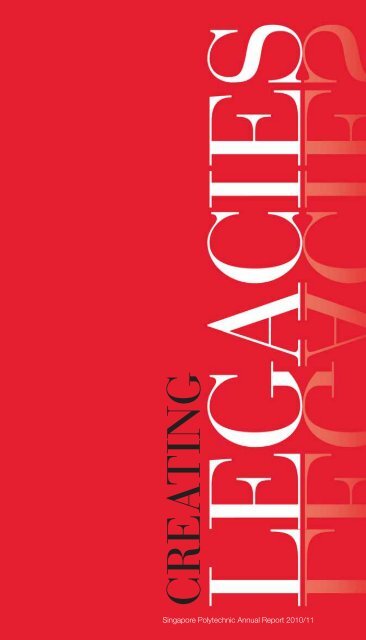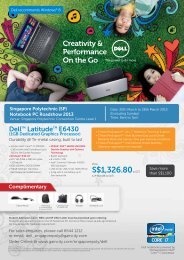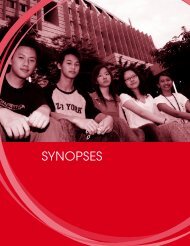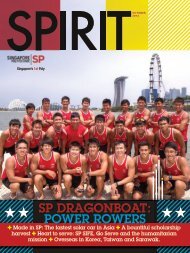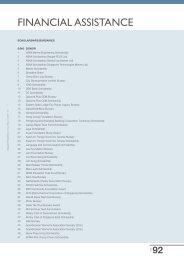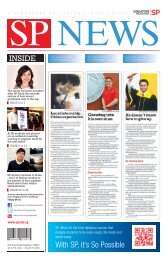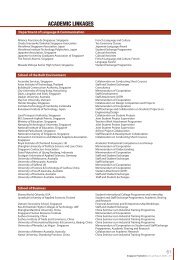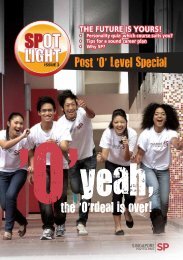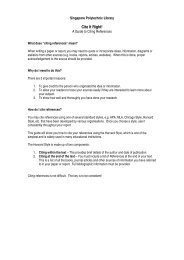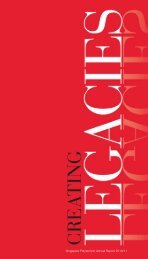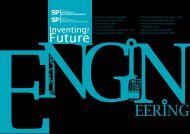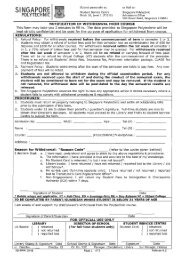CREA TING - Singapore Polytechnic
CREA TING - Singapore Polytechnic
CREA TING - Singapore Polytechnic
You also want an ePaper? Increase the reach of your titles
YUMPU automatically turns print PDFs into web optimized ePapers that Google loves.
<strong>CREA</strong><strong>TING</strong><br />
<strong>Singapore</strong> <strong>Polytechnic</strong> Annual Report 2010/11
CONTENTS<br />
P01<br />
MISSION, VISION, STRATEGIC GOALS AND VALUES<br />
P02<br />
CHAIRMAN’S STATEMENT<br />
P06<br />
BOARD OF GOVERNORS<br />
P08<br />
STANDING COMMITTEES<br />
P10<br />
MANAGEMENT TEAM<br />
P12<br />
FACTS AND FIGURES<br />
P13<br />
HIGHLIGHTS<br />
P23<br />
FINANCIAL REPORT
Students<br />
Teaching<br />
Staff<br />
Alumni<br />
Excellence<br />
Our Focus<br />
Our Passion<br />
Our Asset<br />
Our Pride<br />
Our Creed<br />
Mission<br />
To educate and nurture our students to excel in work and in life, and to<br />
equip adult learners with skills and knowledge to enhance their employability<br />
Vision<br />
A leading institution that prepares our students to be work-ready,<br />
life-ready and world-ready<br />
Strategic Goals<br />
- Providing holistic education<br />
- Fostering global orientation<br />
- Creating learning and social spaces<br />
- Building capabilities<br />
Values<br />
Self-discipline<br />
Personal Integrity<br />
Care and Concern<br />
Openness<br />
Responsibility<br />
Excellence<br />
<strong>Singapore</strong> <strong>Polytechnic</strong> Annual Report 2010/11<br />
01
Tan Kay Yong<br />
Chairman<br />
Board of Governors<br />
<strong>Singapore</strong> <strong>Polytechnic</strong>
Chairman’s<br />
Statement<br />
It has been a year of significant progress towards<br />
our SP@60 vision as we build on our experience<br />
and ability to graduate students who are workready,<br />
life-ready and world-ready.<br />
Key to our vision was how we could deliver a<br />
holistic education that would shape our students<br />
into socially responsible, well-rounded and<br />
confident people who are able to pursue and<br />
excel in diverse interests, disciplines and<br />
opportunities.<br />
Academic Excellence<br />
For the new academic year, we will introduce<br />
the General Education Programme in line with<br />
our vision to produce T-shaped graduates who<br />
are broad in general knowledge with deep<br />
expertise in their chosen fields of interest.<br />
Inspired by the liberal arts curriculum, the<br />
programme enables students to gain knowledge<br />
and experiences to help them form the vital<br />
connection between classroom learning and<br />
the real world. This is important as they will<br />
enter a workforce that must work smart, think<br />
across disciplines, make decisions on the go,<br />
collaborate to build win-win situations and seek<br />
global opportunities.<br />
Plans are also being put in place to challenge<br />
our students further with the launch of SP APEX<br />
Programme. This programme will offer<br />
promising students the best guidance, exposure<br />
and mentorship to facilitate their progress to<br />
university. It will provide a structured teaching<br />
approach and a supportive eco-system –<br />
including the mentorship of our successful<br />
alumni – that will groom and nurture them to<br />
realise their full potential.<br />
The infusion of design thinking into our<br />
pedagogies and programmes has created<br />
opportunities for our staff and students to look<br />
at problems from different perspectives and<br />
develop innovative multi-disciplinary solutions<br />
for real-life scenarios. Design thinking uses a<br />
range of skills and practices to identify needs<br />
and opportunities to create solutions.<br />
Global Footprint<br />
In the course of delivering a holistic education,<br />
we have been constantly growing our regional<br />
and global footprint to broaden our students’<br />
educational and social experiences. In this<br />
academic year alone, we had 2,318 overseas<br />
placements for academic programmes, student<br />
development and industrial attachments. As<br />
we seek more partnerships with educational<br />
institutions around the world and revamp the<br />
way we administer our overseas programmes,<br />
we expect to open more doors for a greater<br />
number of students to benefit from such<br />
experiences.<br />
Among those who ventured overseas during<br />
the year were several outstanding students<br />
who were accepted for internship at Harvard<br />
Medical School, Yale University and Imperial<br />
College. Other bright students took part in the<br />
<strong>Singapore</strong>-MIT GAMBIT Game Lab Programme<br />
and Princeton Model United Nations<br />
Conference. In addition, SP scored a first when<br />
a team of students and lecturers from SP Design<br />
School showcased their work at the prestigious<br />
Milan Furniture Fair in Italy.<br />
We have also been pursuing landmark<br />
partnerships with organisations respected and<br />
renowned for their expertise. One such<br />
partnership was in business design with the<br />
University of Toronto’s Rotman School of<br />
Management. The other was with Procter &<br />
Gamble and University of Cincinnati, to set up<br />
Live Well Collaborative <strong>Singapore</strong>, a research<br />
centre focusing on revolutionising product<br />
design and development for consumers aged<br />
50 and above.<br />
<strong>Singapore</strong> <strong>Polytechnic</strong> Annual Report 2010/11<br />
03
Yet another notable partnership was with<br />
Franklin W Olin College of Engineering from the<br />
United States, one of the world’s top engineering<br />
colleges. SP is the first among our country’s<br />
polytechnics to collaborate with Olin to create<br />
a more dynamic and integrated approach to<br />
engineering education, encompassing content,<br />
curriculum, pedagogy and student assessment.<br />
Our staff are providing consultancy and training<br />
in Mongolia, Vietnam and Indonesia. We have<br />
committed to advising Abu Dhabi in the training<br />
of wafer fabrication technicians. These<br />
opportunities serve to build the capabilities of<br />
our staff, who will be better prepared to share<br />
their knowledge and expertise in and outside<br />
the classroom.<br />
Achievements<br />
Our students and graduates continue to do us<br />
proud on many fronts. Among the 160,000<br />
graduates, Desmond Thiam Wei from the<br />
Diploma in Biomedical Science course became<br />
the first SP student to enter National University<br />
of <strong>Singapore</strong>’s Yong Loo Lin School of Medicine.<br />
Joy Tan, our Diploma in Business Administration<br />
graduate, received the prestigious Public Service<br />
Commission Scholarship. There were many<br />
others like them who were awarded coveted<br />
undergraduate scholarships.<br />
Beyond academic achievements, they have<br />
been making their mark in other areas. Thirtyfour<br />
received the National Youth Achievement<br />
Award (Gold) from President S R Nathan, and<br />
900 volunteered during the inaugural Youth<br />
Olympic Games held in <strong>Singapore</strong>. They were<br />
active too, in supporting RoboCup 2010, the<br />
Olympics of robotics and artificial intelligence.<br />
It was the first time RoboCup was held in South<br />
East Asia, and SP was the first polytechnic<br />
(among world-ranking universities) to have<br />
successfully bid to host the event jointly with<br />
the Science Centre <strong>Singapore</strong>, Economic<br />
Development Board and <strong>Singapore</strong> Tourism<br />
Board.<br />
During the year, we further streamlined our<br />
Technology and Innovation Centres as<br />
specialised hubs of innovation to encourage<br />
staff in their research and development efforts.<br />
Funding of research projects at these centres<br />
received a boost from various sources, including<br />
the Ministry of Education Innovation Fund, the<br />
Totalisator Board Social Innovation Fund and<br />
the National Research Foundation Translational<br />
R&D Grant.<br />
Moving forward, plans are underway to set up<br />
overseas training bases — comprising networks<br />
of global institutions of higher learning, training<br />
and industry partners, and service providers<br />
— to enhance our overseas presence and<br />
programmes. Another initiative in the pipeline<br />
is to offer integrated training systems developed<br />
by SP that can be customised to address the<br />
needs of overseas institutions.<br />
Some of these initiatives will provide new<br />
challenges and opportunities for our staff. We<br />
want our staff to develop their career paths<br />
and passion for teaching at SP. In our staff<br />
development efforts this year, we introduced<br />
an Academic Mentor Scheme and a Leadership<br />
Academy and enhanced the performance<br />
management system using competency-based<br />
criteria from the civil service.<br />
Infrastructure<br />
Recognising that the future is digital, we have<br />
started laying the foundation to create a mobile<br />
technology-enabled campus by 2014 where<br />
teaching, learning, collaboration and services<br />
can be accessed from a mobile phone, tablet<br />
or netbook.<br />
By 2014, our staff and students will be trained<br />
and equipped to use these mobile devices to<br />
make payment, mark attendance, access<br />
laboratories and classrooms, pay for food and<br />
perform other services. We will create a more<br />
stimulating environment that challenges our<br />
staff and students to explore, engage and<br />
innovate. We will make it easier for our staff to<br />
be even more productive and efficient in their<br />
work through initiatives that facilitate their ability<br />
to conduct lessons and access enterprise<br />
systems and government or work-related data<br />
and services through their mobile devices.<br />
04<br />
<strong>Singapore</strong> <strong>Polytechnic</strong> Annual Report 2010/11
This is an ambitious plan that will start with the<br />
progressive upgrade of our existing infrastructure,<br />
computer systems and wireless networks. In<br />
mobile technology expertise, we have been<br />
encouraging both staff and students to develop<br />
mobile applications, starting with those intended<br />
to aid teaching and learning.<br />
Our students’ learning experience will be further<br />
enhanced as we progressively turn SP into a<br />
living lab. Despite the space constraint faced,<br />
we were able to create more social, recreational<br />
and learning spaces. EcOasis is one such<br />
learning space. An outdoor teaching and learning<br />
facility, it serves as a living lab, where students<br />
can study its water filtration system, landscape,<br />
and eco-system. Our staff and students can<br />
also look forward to relaxing at The Sanctuary,<br />
a butterfly park.<br />
Social Responsibility<br />
We set an example to SP staff and students by<br />
taking a stand to be environmentally considerate<br />
in our actions and in the causes that we support.<br />
We initiated water and energy conservation<br />
projects on our own and in partnership with<br />
others. We planted trees and designated carfree<br />
days. On car-free days, our staff and students<br />
were reminded to take the BMW (bus, MRT or<br />
walk) to campus.<br />
Our staff initiated their own community service<br />
projects, with visits and donations to old folks’<br />
homes and collection of clothes, spectacles and<br />
books for various local and overseas voluntary<br />
welfare organisations.<br />
Continuous Education and Training<br />
The future of higher education has a place for<br />
all of us, regardless of age. We are stepping up<br />
our adult learning programmes offered through<br />
the Professional & Adult Continuing Education<br />
(PACE) Academy. This will include setting up a<br />
new framework that will make our part-time<br />
courses more relevant and accessible to working<br />
adults. PACE Academy has trained 18,000<br />
working adults since its launch in 2010.<br />
With a mindset to keep on challenging ourselves,<br />
we will continue to shape students into graduates<br />
who are ready to contribute meaningfully to the<br />
nation and world. I am confident that as gradutes<br />
of SP, they will be ready to create legacies of<br />
success.<br />
In Appreciation<br />
On behalf of the Board, I would like to express<br />
my gratitude to the management and staff of<br />
SP for their contributions during the year in<br />
review.<br />
For our commitment, we received the 2010<br />
President’s Award for the Environment, the<br />
highest accolade in <strong>Singapore</strong> in the field of<br />
environmental sustainability.<br />
I am also pleased to note that our students and<br />
staff have big hearts too, having actively rallied<br />
to give back to the community, both in time and<br />
in kind. Our 2011 freshmen raised a record<br />
$111,638.75 for the President’s Challenge and<br />
$100,000 for Mercy Relief. Other student groups<br />
designed and handed over 23 products to aid<br />
in the rehabilitative movement of beneficiaries<br />
of voluntary welfare organisations.<br />
Mr Tan Kay Yong<br />
Chairman<br />
Board of Governors<br />
<strong>Singapore</strong> <strong>Polytechnic</strong><br />
<strong>Singapore</strong> <strong>Polytechnic</strong> Annual Report 2010/11<br />
05
09<br />
10 11 12 13 14 15<br />
09. Mr Bill Chang York Chye<br />
(Deputy Chairman)<br />
Executive Vice President (Business)<br />
<strong>Singapore</strong> Telecommunications Ltd<br />
10. Prof Pang Yang Hoong<br />
(Member)<br />
Vice Provost (Undergraduate) &<br />
Dean, School of Accountancy<br />
<strong>Singapore</strong> Management University<br />
11. Mr Sew Chee Jhuen<br />
(Member)<br />
President<br />
<strong>Singapore</strong> Technologies Kinetics Ltd<br />
12. Mr Johnny Tan Cheng Hye<br />
(Member)<br />
Principal Partner<br />
LT&T Architects<br />
13. Ms Tan Gee Keow<br />
(Member)<br />
Director (Higher Education)<br />
Ministry of Education<br />
14. Mr Tan Hang Cheong<br />
(Member)<br />
Principal<br />
<strong>Singapore</strong> <strong>Polytechnic</strong><br />
15. Mr Teh Kong Leong<br />
(Member)<br />
Consultant<br />
Mr Tan Peng Ann<br />
(Secretary)<br />
Registrar<br />
<strong>Singapore</strong> <strong>Polytechnic</strong><br />
<strong>Singapore</strong> <strong>Polytechnic</strong> Annual Report 2010/11<br />
07
Standing<br />
Committees<br />
Administration & Development Committee<br />
Chairman: Mr Tan Kay Yong<br />
Dy Chairman: Mr Bill Chang York Chye<br />
Members:<br />
Prof Chou Siaw Kiang<br />
Mr Gan Boon San<br />
Mr Johnny Tan Cheng Hye<br />
Mr Tan Hang Cheong<br />
Ms Tan Gee Keow<br />
Secretary: Miss Caroline Hu Wei Choo (up to 11 January 2011)<br />
Mrs Yeung-Ng Geak Hong (from 12 January 2011)<br />
Assistant Secretary: Mrs Cheng Cheng Lin<br />
Audit Committee<br />
Chairman:<br />
Members:<br />
Mr Teh Kong Leong<br />
Prof Er Meng Hwa<br />
Mr Liew Choon Boon<br />
Endowment Fund Committee<br />
Chairman:<br />
Members:<br />
Secretary:<br />
Nominating Committee<br />
Chairman:<br />
Members:<br />
Mr Liew Choon Boon<br />
A/Prof Muhammad Faishal Bin Ibrahim<br />
Mr Tan Hang Cheong<br />
Mrs Cheng Cheng Lin<br />
Mr Tan Kay Yong<br />
Mr Bill Chang York Chye<br />
Mr Tan Hang Cheong<br />
Staff Disciplinary Committee<br />
Chairman: Prof Er Meng Hwa<br />
Members:<br />
COL Chan Weng Yip<br />
A/Prof Muhammad Faishal Bin Ibrahim<br />
Secretary: Miss Caroline Hu Wei Choo (up to 11 January 2011)<br />
Mrs Yeung-Ng Geak Hong (from 12 January 2011)<br />
Student Disciplinary Appeal Committee<br />
Chairman:<br />
Members:<br />
Secretary:<br />
Mr Sew Chee Jhuen<br />
Dr Michael Edward Brown<br />
Prof Pang Yang Hoong<br />
Mr Tan Peng Ann<br />
08<br />
<strong>Singapore</strong> <strong>Polytechnic</strong> Annual Report 2010/11
Board of Studies<br />
The new two-year term of the Board commenced on 1 April 2010. A total of six academic<br />
staff members were elected as new members to serve on the Board: Mr Ho Sum Lim,<br />
Ms Jennifer Wong Pui Cheng, Mr Jimmy Chew Kwok Tim, Mdm Lee Keng Keng, Mr Kelly Lee<br />
Wai Kin and Mrs Tan-Yeoh Ah Choo. Four academic staff were re-elected to the Board:<br />
Dr Audrey A Yuen, Mr Caleb Lye Kok Choy, Mr Lee Chee Whye and Mr William Chan Weng Lin.<br />
Chairman:<br />
Members:<br />
Secretary:<br />
Mr Tan Hang Cheong<br />
Mr Hee Joh Liang<br />
Mr Lim Peng Hun<br />
Mr Edward Quah Kok Wah (up to 16 November 2010)<br />
Dr Chai Min Sen<br />
Dr Dave Chong Tad Weng<br />
Mr Lim Cher Yam<br />
Dr Timothy Chan Wai Kuen<br />
Mr Chang Boon Hai<br />
Miss Chao Yunn Chyi<br />
Mrs Fang Sin Guek<br />
Mr Faris Akbar Hajamaideen<br />
Mrs Lam Yoke Peng<br />
Mr Lau Lee Yee<br />
Dr Ng Eng Hong<br />
Mr Ng Weng Lam<br />
Miss Pee Suat Hoon<br />
Ms Georgina Phua Hwee Choo (from 1 April 2010)<br />
Mr Roland Tan Keng Hock<br />
Mr Tan Yew Meng (from 1 April 2010)<br />
Mr William Chan Weng Lin<br />
Mr Jimmy Chew Kwok Tim<br />
Mr Ho Sum Lim<br />
Mr Lee Chee Whye<br />
Mdm Lee Keng Keng<br />
Mr Kelly Lee Wai Kin<br />
Mr Caleb Lye Kok Choy<br />
Mrs Tan-Yeoh Ah Choo<br />
Ms Jennifer Wong Pui Cheng<br />
Mrs Yap Siew Lay<br />
Dr Audrey A Yuen<br />
Mr Tan Peng Ann<br />
<strong>Singapore</strong> <strong>Polytechnic</strong> Annual Report 2010/11<br />
09
Management<br />
Team<br />
PRINCIPAL<br />
Mr Tan Hang Cheong<br />
DEPUTY PRINCIPAL<br />
(ACADEMIC PLANNING)<br />
Mr Hee Joh Liang<br />
DEPUTY PRINCIPAL (SERVICES)<br />
Mr Edward Quah Kok Wah<br />
(up to 16 November 2010)<br />
DEPUTY PRINCIPAL<br />
(TECHNOLOGY AND INDUSTRY)<br />
Mr Lim Peng Hun<br />
ACADEMIC PLANNING<br />
Deputy Principal<br />
Mr Hee Joh Liang<br />
Director, Academic Programmes<br />
Mr Lau Lee Yee<br />
Director, Educational Development<br />
Miss Pee Suat Hoon<br />
Director, Library<br />
Mrs Fang Sin Guek<br />
Director, Organisation Development<br />
Mr Henry Tan Hin Teck<br />
CORPORATE DEVELOPMENT<br />
Director, Corporate Communications<br />
Mrs Kai Tamin-Goh<br />
TECHNOLOGY AND INDUSTRY<br />
Deputy Principal<br />
Mr Lim Peng Hun<br />
Director, Alumni Relations Office<br />
Mr Song Nay Hay<br />
(from 17 November 2010)<br />
Director, Industry Services<br />
Mr Song Nay Hay<br />
Director, Professional & Adult Continuing<br />
Education (PACE) Academy<br />
Mr Peter Lee Hoong Fatt<br />
(up to 21 June 2010)<br />
Mr V Maheantharan<br />
(from 22 June 2010)<br />
Director, Technology Development Office<br />
Mr Lim Peng Hun<br />
Director, Finance<br />
Mrs Cheng Cheng Lin<br />
Director, Human Resource<br />
Miss Caroline Hu Wei Choo<br />
(up to 11 January 2011)<br />
Mrs Yeung-Ng Geak Hong<br />
(from 12 January 2011)<br />
Director, Internal Audit<br />
Mr Ronnie Chan Chin Sing<br />
Director, Leadership Academy<br />
Miss Caroline Hu Wei Choo<br />
(from 13 January 2011)<br />
10<br />
<strong>Singapore</strong> <strong>Polytechnic</strong> Annual Report 2010/11
INFRASTRUCTURE AND<br />
ENVIRONMENT CLUSTER<br />
Senior Director<br />
Mr Lim Cher Yam<br />
Director, Computer & Information Systems<br />
Mr Chang Boon Hai<br />
Director, Estates & Development<br />
Mr C Pannirselvam<br />
Director, Green Energy & Environment<br />
Project Office<br />
Mr Lim Cher Yam<br />
(from 17 November 2010)<br />
STUDENT AND ACADEMIC<br />
SERVICES CLUSTER<br />
Senior Director<br />
Mr Tan Peng Ann<br />
Registrar/Director, Academic Services<br />
Mr Tan Peng Ann<br />
Director, Student Development<br />
Mr Liew Beng Keong<br />
(up to 31 August 2010)<br />
Mr Arthur Poh Heo Tat<br />
(from 1 September 2010)<br />
Academic Schools<br />
APPLIED AND HEALTH SCIENCES<br />
CLUSTER<br />
Senior Director<br />
Dr Chai Min Sen<br />
Director, Chemical & Life Sciences<br />
Dr Chai Min Sen<br />
Director, Mathematics & Science<br />
Miss Chao Yunn Chyi<br />
ARCHITECTURE, DESIGN AND<br />
ENVIRONMENT CLUSTER<br />
Senior Director<br />
Mr Lim Cher Yam<br />
Director, Architecture &<br />
the Built Environment<br />
Mr Tan Yew Meng<br />
Director, Design<br />
Mr Faris Akbar Hajamaideen<br />
BUSINESS, IT AND HUMANITIES<br />
CLUSTER<br />
Senior Director<br />
Mr Lim Peng Hun<br />
(up to 16 November 2010)<br />
Mr Hee Joh Liang<br />
(from 17 November 2010)<br />
Director, Business<br />
Dr Timothy Chan Wai Kuen<br />
Director, Communication,<br />
Arts & Social Sciences<br />
Mrs Lam Yoke Peng<br />
Director, Digital Media &<br />
Infocomm Technology<br />
Ms Georgina Phua Hwee Choo<br />
ENGINEERING CLUSTER<br />
Senior Director<br />
Dr Dave Chong Tad Weng<br />
Director, Electrical & Electronic Engineering<br />
Mr Ng Weng Lam<br />
Director, Mechanical &<br />
Aeronautical Engineering<br />
Dr Ng Eng Hong<br />
Director, <strong>Singapore</strong> Maritime Academy<br />
Mr Roland Tan Keng Hock<br />
<strong>Singapore</strong> <strong>Polytechnic</strong> Annual Report 2010/11<br />
11
Facts and Figures<br />
GRADUATES<br />
IN LOCAL<br />
UNIVERSITIES<br />
1,125<br />
in 2010, at the same time,<br />
176 students graduated with<br />
First Class Honours or<br />
Second Class (Upper)<br />
Honours.<br />
STUDENT<br />
ENROLMENT<br />
18,273<br />
comprising 15,943 full-time<br />
and 2,330 part-time<br />
students. The new intake of<br />
6,628 students was made<br />
up of 5,431 full-time and<br />
1,197 part-time students in<br />
the academic year<br />
2010/2011.<br />
STAFF<br />
STRENGTH<br />
1,471<br />
comprising 893<br />
academic staff and 578<br />
administrative staff.<br />
CONTINUING<br />
EDUCATION<br />
PROGRAMMES<br />
37,728<br />
participants attended a total<br />
of 850 continuing education<br />
programmes offered by<br />
<strong>Singapore</strong> <strong>Polytechnic</strong>. The<br />
programmes included 128<br />
<strong>Singapore</strong> Workforce Skills<br />
Qualification courses, 363<br />
short courses, 178 tailormade<br />
courses and 177<br />
certification courses.<br />
STUDENT<br />
CLUBS<br />
136<br />
student clubs and<br />
sports teams<br />
contributed to a<br />
vibrant campus life.<br />
GRADUATE<br />
OUTPUT &<br />
EMPLOYMENT<br />
5,397<br />
students graduated from<br />
<strong>Singapore</strong> <strong>Polytechnic</strong> in the<br />
academic year 2009/2010.<br />
Of these, 4,835 graduated<br />
from diploma courses and<br />
562 from advanced,<br />
specialist and post-diploma<br />
courses.<br />
As at 1 October 2010,<br />
90.5% of fresh graduates<br />
found full-time permanent<br />
or part-time/temporary<br />
employment.<br />
12<br />
<strong>Singapore</strong> <strong>Polytechnic</strong> Annual Report 2010/11
Highlights<br />
April 2010<br />
Mr Lee Yi Shyan, Minister<br />
of State for Trade & Industry<br />
and Manpower, officially<br />
opened the Professional &<br />
Adult Continuing Education<br />
(PACE) Academy at SP.<br />
Mr Lim Boon Heng, Minister in the Prime<br />
Minister's Office (second from left), launched<br />
the Nutrition, Health and Wellness Centre<br />
at SP. In conjunction with the event, a<br />
Memorandum of Understanding was signed<br />
with the Ulu Pandan Wellness Programme<br />
Management Committee to provide<br />
comprehensive wellness programmes to<br />
residents in Ulu Pandan.<br />
SP signed a Memorandum of Cooperation with<br />
Mercy Relief to strengthen humanitarian efforts<br />
in the region.<br />
SP students clinched 16 out of 32 IDA<br />
Integrated Infocomm Scholarships. The<br />
recipients came from seven diplomas offered<br />
by the School of Digital Media and Infocomm<br />
Technology and the SP Design School. Another<br />
two SP graduates were awarded the IDA<br />
National Infocomm Scholarship.<br />
The School of Architecture and the Built<br />
Environment launched a new Diploma-Plus<br />
Certificate in Sustainability to impart concepts<br />
and principles of sustainability, as well as to<br />
build an awareness of global environmental<br />
issues.<br />
The School of Chemical and Life Sciences was<br />
recognised for ‘Excellence in Education and<br />
Training in Chemical Engineering’ at the<br />
inaugural IChemE <strong>Singapore</strong> Innovation and<br />
Excellence Awards. The award recognised the<br />
innovative effort in the development of the new<br />
pedagogy that provided a more pragmatic<br />
learning experience for Diploma in Chemical<br />
Engineering students.<br />
The Department of Industry Services organised<br />
the inaugural Entrepreneurship Development<br />
Programme to guide young aspiring<br />
entrepreneurs in SP.<br />
Staff and students travelled by ‘BMW’ (Bus,<br />
MRT, Walk) to campus on Earth Day. The<br />
Car-Free Day was in support of SP’s Go Green<br />
movement.<br />
<strong>Singapore</strong> <strong>Polytechnic</strong> Annual Report 2010/11<br />
13
May 2010<br />
The Governor-General of New<br />
Zealand, Sir Anand Satyanand, and<br />
his wife Lady Susan Satyanand<br />
visited Massey University <strong>Singapore</strong><br />
campus in SP.<br />
Desmond Thiam Wei, a Diploma in<br />
Biomedical Science graduate, became the<br />
first SP graduate to be accepted into<br />
National University of <strong>Singapore</strong>'s Yong<br />
Loo Lin School of Medicine.<br />
InnoV@SP was awarded the Building and<br />
Construction Authority Green Mark Platinum<br />
Award for its eco-friendly and innovative features.<br />
The award is intended to promote sustainability<br />
in the built environment and raise environmental<br />
awareness among developers, designers and<br />
builders.<br />
Kuriakin Zeng, a Diploma in Electronics, Computer and Communication<br />
Engineering graduate, became the first SP student in Harvard College to<br />
receive a full scholarship for his studies. Harvard College is part of Harvard<br />
University’s Faculty of Arts and Sciences.<br />
Lee Wei Jian and Yee Zheng Kang, both Diploma in Aerospace<br />
Electronics graduates, and Boon Le Tang, a Diploma in Electrical<br />
and Electronic Engineering graduate, were offered the DSTA Local<br />
Undergraduate Scholarship.<br />
SP launched its bond-free Engineering Scholarship, which awarded<br />
each recipient with full tuition fees, a $1,000 subsidy for a notebook<br />
PC and opportunities to go on local or overseas R&D attachments<br />
and attend engineering conferences and activities.<br />
SP celebrated its 50th Graduation Ceremony with guest-of-honour<br />
Dr Ng Eng Hen, Minister for Education and Second Minister for<br />
Defence. This milestone event also commemorated SP’s 150,000th<br />
graduate, in the presence of SP's first student, 50,000th graduate<br />
and 100,000th graduate on stage.<br />
14<br />
<strong>Singapore</strong> <strong>Polytechnic</strong> Annual Report 2010/11
June 2010<br />
Together with Science Centre<br />
<strong>Singapore</strong>, Economic<br />
Development Board and<br />
<strong>Singapore</strong> Tourism Board,<br />
SP organised RoboCup 2010,<br />
dubbed the Olympics of the<br />
robotics industry. The event<br />
was held in South East Asia for<br />
the first time.<br />
Daniel Poh Yuan Kai and<br />
Jaslyn Ng Hui Shan, both<br />
Diploma in Biomedical<br />
Science students, were the<br />
first polytechnic students<br />
to participate in an<br />
overseas internship at<br />
Harvard Medical School.<br />
Reuben Raman, a Diploma in Music and Audio Technology student, was selected to participate<br />
in the <strong>Singapore</strong>-MIT GAMBIT Game Lab Summer Programme.<br />
<strong>Singapore</strong> <strong>Polytechnic</strong> Annual Report 2010/11<br />
15
July 2010<br />
SP’s first-ever tree auction<br />
raised $15,100, part of which<br />
was donated to South West<br />
Community Development<br />
Council Dover Community’s<br />
‘1,000,000 Native Plants @<br />
South West’ green<br />
programme.<br />
Joy Tan, a Diploma<br />
in Business<br />
Administration<br />
graduate, received<br />
the Public Service<br />
Commission<br />
Scholarship.<br />
For the second time<br />
running, Lio Shilei<br />
and Chessa Lim,<br />
both Diploma in<br />
Creative Media<br />
Design students,<br />
represented <strong>Singapore</strong> at<br />
the Imagine Cup finals<br />
in Warsaw, Poland, and<br />
emerged third in the<br />
Digital Media category.<br />
SP signed an agreement with the Media<br />
Development Authority to set up a resource<br />
centre to facilitate the Games-in-Learning<br />
initiative using Microsoft’s XNA Game Studio<br />
or other suitable platforms.<br />
SP students received 20 out of 22 <strong>Singapore</strong><br />
Indian Education Trust Study Achievement<br />
Awards.<br />
16<br />
<strong>Singapore</strong> <strong>Polytechnic</strong> Annual Report 2010/11
August 2010<br />
Twenty-three<br />
<strong>Singapore</strong> Maritime<br />
Academy students<br />
and graduates<br />
received<br />
scholarships at the<br />
Maritime Port<br />
Authority and<br />
MaritimeONE<br />
Scholarship<br />
Awards<br />
Ceremony.<br />
Kingsley Boey Qi Yi,<br />
a Diploma in<br />
Business Information<br />
Technology<br />
graduate, was one of<br />
seven recipients of<br />
the SAF Merit<br />
Scholarship.<br />
Dr Toh Wei Siong, an SP<br />
alumnus, entered Harvard<br />
Medical School after receiving<br />
the A*STAR International<br />
Fellowship.<br />
Forty Diploma in Creative Writing for TV and New Media students supported the Youth Olympic<br />
Games as news service reporters, web reporters, web photojournalists, webmaster assistants,<br />
video editors, media operations assistants and photo services assistants.<br />
<strong>Singapore</strong> <strong>Polytechnic</strong> Annual Report 2010/11<br />
17
September 2010<br />
SP and Rotman<br />
DesignWorks of the<br />
University of Toronto jointly<br />
launched DesignWorks<br />
<strong>Singapore</strong>, a designbased<br />
education and<br />
innovation centre focusing<br />
on business design.<br />
The Live Well Collaborative<br />
<strong>Singapore</strong> (LWC-S) centre, the<br />
only one outside the United<br />
States, was established at SP.<br />
LWC was founded by Procter &<br />
Gamble and the University of<br />
Cincinnati and focuses on<br />
research on products and<br />
services for the 50+ community.<br />
Four internationally renowned keynote speakers presented at the Design Thinking Summit at<br />
SP. They were Heather Fraser, Director of Rotman DesignWorks and Business Design Initiative;<br />
Vijay Kumar, Professor at Illinois Institute of Technology, Institute of Design; Craig Vogel, President<br />
of Live Well Collaborative and Associate Dean at University of Cincinnati; and Matthew Doyle,<br />
Vice President of Live Well Collaborative and Director of Research and Development at Procter<br />
& Gamble.<br />
SP and Temasek<br />
Foundation began<br />
training Mongolia’s<br />
technical and<br />
vocational teachers<br />
as part of a threeyear<br />
joint project.<br />
Dr Ang Kah Wee, an SP alumnus, received the prestigious 2010 President’s Technology Award,<br />
the highest national award conferred on exceptional individuals and teams for excellent achievements<br />
in science and technology.<br />
18<br />
<strong>Singapore</strong> <strong>Polytechnic</strong> Annual Report 2010/11
October 2010<br />
SP received the 2010<br />
President’s Award for the<br />
Environment, the highest<br />
accolade in <strong>Singapore</strong> for<br />
achievements in the field of<br />
environmental sustainability<br />
- a first for a local<br />
polytechnic.<br />
Thirty-four SP students –<br />
the highest number among<br />
all polytechnics – received<br />
the National Youth<br />
Achievement Awards<br />
(Gold) from President S R<br />
Nathan.<br />
SP launched its very own radio<br />
station called SPACE Radio.<br />
SP Business School graduates emerged<br />
runners-up at the Asian Management Game<br />
after a close competition with teams from India,<br />
Macau, Malaysia and Hong Kong.<br />
SP signed a Memorandum of Understanding<br />
with Resorts World Sentosa for internship<br />
opportunities for students from SP and other<br />
polytechnics.<br />
<strong>Singapore</strong> <strong>Polytechnic</strong> Annual Report 2010/11<br />
19
November 2010<br />
Dr Tan Eng Lee, a School of<br />
Chemical and Life Sciences<br />
lecturer, invented the world’s<br />
fastest test kit for Hand, Foot<br />
and Mouth Disease.<br />
Fourteen SP Outstanding Talent<br />
students attended the annual<br />
Princeton Model United Nations<br />
Conference at Princeton<br />
University, joining students from<br />
the United States and around the<br />
world to engage in current affairs.<br />
The pioneer batch of 29 students from Massey University <strong>Singapore</strong>, based in SP campus,<br />
received their Bachelor of Food Technology (Honours). Massey University is one of the top<br />
five food technology institutes in the world.<br />
December 2010<br />
An animation clip by<br />
three School of Digital<br />
Media and Infocomm<br />
Technology students,<br />
entitled ‘Wedding<br />
Interlude’, won the<br />
Panorama-Asia Pacific<br />
Design Challenge 2010<br />
and was shown on Asia<br />
Animax TV Channel as<br />
well as in France, Hong<br />
Kong and China.<br />
20<br />
<strong>Singapore</strong> <strong>Polytechnic</strong> Annual Report 2010/11
January 2011<br />
SP clinched the South West<br />
Environment and Community<br />
Award (Community Category)<br />
for outstanding contributions to<br />
environmental and community<br />
sustainability in the district.<br />
SP students won five gold, one<br />
silver and three bronze medals<br />
at the <strong>Singapore</strong> round of the<br />
WorldSkills Competition. The<br />
gold medallists will represent<br />
<strong>Singapore</strong> at the 41st<br />
WorldSkills Competition in<br />
London in October 2011.<br />
SPectrum study area<br />
The first-of-its-kind in a polytechnic, the<br />
Diploma in Info-communication Engineering<br />
and Design offered a unique curriculum<br />
combining engineering with design.<br />
Andrew Ong, a Diploma in Aeronautical<br />
Engineering graduate, won the prestigious<br />
Global Merit Scholarship offered by the<br />
National University of <strong>Singapore</strong>.<br />
SP opened a skate park,<br />
drifters court and<br />
Starbucks Coffee on<br />
campus, all firsts for a<br />
polytechnic in <strong>Singapore</strong>.<br />
These and other new<br />
learning and social<br />
spaces like the SPectrum<br />
study area contributed to<br />
a more vibrant campus<br />
experience.<br />
A Memorandum of Understanding was inked<br />
with Advanced Technology Investment<br />
Company, wholly owned by the government<br />
of Abu Dhabi, to train wafer fabrication<br />
technicians.<br />
Two Diploma in Biomedical Science students<br />
went to Yale University for their Overseas<br />
Internship Training Programme.<br />
<strong>Singapore</strong> <strong>Polytechnic</strong> Annual Report 2010/11<br />
21
February 2011<br />
SP set a national record<br />
when its mosaic of<br />
recycled banners was<br />
declared the ‘Largest<br />
Mosaic Made Using<br />
Used Banners in<br />
<strong>Singapore</strong>’, gaining an<br />
entry in the <strong>Singapore</strong><br />
Book of Records.<br />
Final-year Diploma in Media and Communication students organised the inaugural Media<br />
and Communication Conference 2011.<br />
March 2011<br />
Twenty-four Diploma in Tourism<br />
and Resort Management<br />
students underwent two<br />
weeks of academic<br />
programme at University of<br />
California Riverside for their<br />
Certificate in Hospitality and<br />
Tourism Management followed<br />
by a six-month academic<br />
training experience at Walt<br />
Disney World in Florida,<br />
United States.<br />
Three teams of SP lecturers received support<br />
from the Totalisator Board Social Innovation<br />
Research Fund for projects to benefit the<br />
social sector and improve the social<br />
environment.<br />
The Department of Mathematics and Science<br />
became the School of Mathematics and<br />
Science.<br />
22<br />
<strong>Singapore</strong> <strong>Polytechnic</strong> Annual Report 2010/11
Financial<br />
Report<br />
For the financial year ended 31 March 2011
Statement by Board of Governors<br />
For the financial year ended 31 March 2011<br />
In the opinion of the Board of Governors,<br />
(a) the financial statements as set out on pages 27 to 52 are drawn up so as to give a true and<br />
fair view of the state of affairs of the <strong>Polytechnic</strong> as at 31 March 2011 and of the results,<br />
changes in funds and reserves and cash flows of the <strong>Polytechnic</strong> for the financial year then<br />
ended; and<br />
(b) at the date of this statement, there are reasonable grounds to believe that the <strong>Polytechnic</strong><br />
will be able to pay its debts as and when they fall due.<br />
On behalf of the Board<br />
Tan Kay Yong<br />
Chairman<br />
Tan Hang Cheong<br />
Principal<br />
30 June 2011<br />
24<br />
<strong>Singapore</strong> <strong>Polytechnic</strong> Annual Report 2010/11
Independent Auditor’s Report to The Members of<br />
The Board of Governors of <strong>Singapore</strong> <strong>Polytechnic</strong><br />
Report on the Financial Statements<br />
We have audited the accompanying financial statements of <strong>Singapore</strong> <strong>Polytechnic</strong> (the “<strong>Polytechnic</strong>”)<br />
set out on pages 27 to 52, which comprise the balance sheet of the <strong>Polytechnic</strong> as at 31 March<br />
2011, the statement of comprehensive income, the statement of changes in funds and reserves<br />
and the statement of cash flows for the financial year then ended, and a summary of significant<br />
accounting policies and other explanatory information.<br />
Management’s Responsibility for the Financial Statements<br />
Management is responsible for the preparation of financial statements that give a true and fair<br />
view in accordance with the provisions of the <strong>Singapore</strong> <strong>Polytechnic</strong> Act, Chapter 303 (the “Act”)<br />
and Statutory Board Financial Reporting Standards, and for devising and maintaining a system<br />
of internal accounting controls sufficient to provide a reasonable assurance that assets are<br />
safeguarded against loss from unauthorised use or disposition, that transactions are properly<br />
authorised and that they are recorded as necessary to permit the preparation of true and fair<br />
profit and loss accounts and balance sheets and to maintain accountability of assets.<br />
Auditor’s Responsibility<br />
Our responsibility is to express an opinion on these financial statements based on our audit. We<br />
conducted our audit in accordance with <strong>Singapore</strong> Standards on Auditing. Those Standards<br />
require that we comply with ethical requirements and plan and perform the audit to obtain<br />
reasonable assurance about whether the financial statements are free from material misstatement.<br />
An audit involves performing procedures to obtain audit evidence about the amounts and<br />
disclosures in the financial statements. The procedures selected depend on the auditor’s judgement,<br />
including the assessment of the risks of material misstatement of the financial statements, whether<br />
due to fraud or error. In making those risk assessments, the auditor considers internal controls<br />
relevant to the entity’s preparation of financial statements that give a true and fair view in order<br />
to design audit procedures that are appropriate in the circumstances, but not for the purpose<br />
of expressing an opinion on the effectiveness of the entity’s internal controls. An audit also includes<br />
evaluating the appropriateness of accounting policies used and the reasonableness of accounting<br />
estimates made by management as well as evaluating the overall presentation of the financial<br />
statements.<br />
We believe that the audit evidence we have obtained is sufficient and appropriate to provide a<br />
basis for our audit opinion.<br />
Opinion<br />
In our opinion, the financial statements of the <strong>Polytechnic</strong> are properly drawn up in accordance<br />
with the provisions of the Act and Statutory Board Financial Reporting Standards so as to give<br />
a true and fair view of the state of affairs of the <strong>Polytechnic</strong> as at 31 March 2011, and the results,<br />
changes in funds and reserves and cash flows of the <strong>Polytechnic</strong> for the financial year ended on<br />
that date.<br />
<strong>Singapore</strong> <strong>Polytechnic</strong> Annual Report 2010/11<br />
25
Report on Other Legal and Regulatory Requirements<br />
During the course of our audit, nothing came to our notice that caused us to believe that:<br />
(a) the receipt, expenditure and investment of monies and the acquisition and disposal of assets<br />
by the <strong>Polytechnic</strong> during the financial year have not been made in accordance with the<br />
provisions of the Act; and<br />
(b) in relation to the <strong>Singapore</strong> <strong>Polytechnic</strong> Endowment Fund (the “Fund”).<br />
(i)<br />
the use of donations monies was not in accordance with the objectives of the Fund;<br />
(ii) the Fund did not comply with the requirements of regulation 15 (Fund-raising expenses)<br />
of the Charities (Institutions of a Public Character) Regulations 2007 during the financial<br />
year.<br />
PricewaterhouseCoopers LLP<br />
Public Accountants and Certified Public Accountants<br />
<strong>Singapore</strong><br />
30 June 2011<br />
26<br />
<strong>Singapore</strong> <strong>Polytechnic</strong> Annual Report 2010/11
Statement of Comprehensive Income<br />
For the financial year ended 31 March 2011<br />
General fund Other funds Total<br />
2011 2010 2011 2010 2011 2010<br />
Note $'000 $'000 $'000 $'000 $'000 $'000<br />
Operating income<br />
Course fees 39,762 38,015 14,944 12,095 54,706 50,110<br />
Other fees 947 916 - - 947 916<br />
40,709 38,931 14,944 12,095 55,653 51,026<br />
Operating expenditure<br />
Staff costs 3 (173,523) (152,114) (7,211) (5,981) (180,734) (158,095)<br />
Teaching materials (7,914) (7,717) (584) (870) (8,498) (8,587)<br />
Repairs and maintenance (15,674) (14,064) - - (15,674) (14,064)<br />
Depreciation of property,<br />
plant and equipment 9 (29,607) (28,003) (732) (568) (30,339) (28,571)<br />
Development<br />
expenses written-off (9,730) (10,996) - - (9,730) (10,996)<br />
Staff development<br />
and benefits (4,723) (3,603) - - (4,723) (3,603)<br />
Other expenditure 4 (23,521) (21,547) (7,876) (7,580) (31,397) (29,127)<br />
(264,692) (238,044) (16,403) (14,999) (281,095) (253,043)<br />
Operating deficit (223,983) (199,113) (1,459) (2,904) (225,442) (202,017)<br />
Non-operating income<br />
Donations - - 1,127 672 1,127 672<br />
Interest income - banks 712 283 549 616 1,261 899<br />
Rental income -<br />
operating leases 213 240 1,779 1,638 1,992 1,878<br />
Other income 2,345 1,294 5,056 4,518 7,401 5,812<br />
(Deficit)/Surplus<br />
before grants (220,713) (197,296) 7,052 4,540 (213,661) (192,756)<br />
Grants 5 246,597 216,153 201 1,151 246,798 217,304<br />
Surplus for the year 25,884 18,857 7,253 5,691 33,137 24,548<br />
Other comprehensive<br />
income<br />
Net change in fair value of<br />
financial assets,<br />
available-for-sale - - 8 (58) 8 (58)<br />
Total comprehensive<br />
income 25,884 18,857 7,261 5,633 33,145 24,490<br />
The accompanying notes form an integral part of these financial statements.<br />
<strong>Singapore</strong> <strong>Polytechnic</strong> Annual Report 2010/11<br />
27
Balance Sheet<br />
For the financial year ended 31 March 2011<br />
Note 2011 2010<br />
$'000<br />
$'000<br />
Endowment fund (Capital) 7 17,817 13,083<br />
Accumulated surplus<br />
General fund 115,607 91,723<br />
Other funds 7 92,686 85,433<br />
Fair value reserve 525 517<br />
Total capital and other funds 226,635 190,756<br />
Funds managed on behalf of the Ministry 8 5,709 5,478<br />
Funds’ net assets managed on behalf of<br />
the Ministry 8 (5,709) (5,478)<br />
- -<br />
Represented by:<br />
Non-current assets<br />
Property, plant and equipment 9 284,989 273,969<br />
Investment in subsidiaries 10 1,100 1,100<br />
Financial assets, available-for-sale 11 5,450 5,400<br />
Loan to <strong>Singapore</strong> <strong>Polytechnic</strong> Graduates’ Guild 12 - -<br />
Staff and student loans 13 379 327<br />
291,918 280,796<br />
Current assets<br />
Financial assets, available-for-sale 11 - 3,042<br />
Trade and other receivables 14 24,197 19,310<br />
Cash and cash equivalents 15 280,364 228,126<br />
304,561 250,478<br />
Total assets 596,479 531,274<br />
Current liabilities<br />
Trade and other payables 16 45,679 38,209<br />
Government grants received in advance 17 43,656 32,268<br />
89,335 70,477<br />
Net current assets 215,226 180,001<br />
Non-current liabilities<br />
Deferred capital grants 18 280,509 270,041<br />
Total liabilities 369,844 340,518<br />
Net assets 226,635 190,756<br />
The accompanying notes form an integral part of these financial statements.<br />
28<br />
<strong>Singapore</strong> <strong>Polytechnic</strong> Annual Report 2010/11
Statement of Changes in Funds and Reserves<br />
For the financial year ended 31 March 2011<br />
Endowment<br />
fund General Other Fair value<br />
(Capital) fund funds reserve Total<br />
(Note 7) (Note 7)<br />
$'000 $'000 $'000 $'000 $'000<br />
At 1 April 2010 13,083 91,723 85,433 517 190,756<br />
Total comprehensive income - 25,884 7,253 8 33,145<br />
Transfer of accumulated<br />
surplus to endowment fund<br />
(capital) 2,000 (2,000) - - -<br />
Contributions and donations<br />
received for the endowment<br />
fund (capital) 2,734 - - - 2,734<br />
At 31 March 2011 17,817 115,607 92,686 525 226,635<br />
At 1 April 2009 13,078 72,866 79,742 575 166,261<br />
Total comprehensive income - 18,857 5,691 (58) 24,490<br />
Contributions and donations<br />
received for the endowment<br />
fund (capital) 5 - - - 5<br />
At 31 March 2010 13,083 91,723 85,433 517 190,756<br />
The accompanying notes form an integral part of these financial statements.<br />
<strong>Singapore</strong> <strong>Polytechnic</strong> Annual Report 2010/11<br />
29
Statement of Cash Flows<br />
For the financial year ended 31 March 2011<br />
Note 2011 2010<br />
$'000<br />
$'000<br />
Cash flows from operating activities<br />
Deficit before grants (213,661) (192,756)<br />
Adjustment for:<br />
Depreciation of property, plant and equipment 9 30,339 28,571<br />
Interest income (1,261) (899)<br />
Loss on disposal of property, plant and equipment 54 11<br />
(184,529) (165,073)<br />
Changes in working capital:<br />
Trade and other receivables 1,288 649<br />
Staff and student loans (47) (55)<br />
Trade and other payables 7,470 726<br />
Net cash used in operating activities (175,818) (163,753)<br />
Cash flows from investing activities<br />
Interest received 1,261 899<br />
Purchases of property, plant and equipment (41,458) (51,046)<br />
Proceeds from disposals of property, plant and<br />
equipment 45 15<br />
Cash flows used in investing activities (40,152) (50,132)<br />
Cash flows from financing activities<br />
Development grants received from Government 18,213 34,943<br />
IT and F & E grants received from Government 23,995 22,945<br />
Innovation grants received from Government 931 660<br />
Operating grants received from Government 217,195 225,474<br />
Operating grants received from non-government<br />
organisations 2,859 2,593<br />
Contributions and donations received for the<br />
endowment fund (capital) 2,015 5<br />
Net increase in fixed deposits with more<br />
than three months maturity (56,692) (40,243)<br />
Proceeds from the maturity of financial assets,<br />
available-for-sale 3,000 -<br />
Net cash provided by financing activities 211,516 246,377<br />
Net (decrease)/increase in cash and cash<br />
equivalents (4,454) 32,492<br />
Cash and cash equivalents at beginning of the year 187,469 154,977<br />
Cash and cash equivalents at end of the year 15 183,015 187,469<br />
The accompanying notes form an integral part of these financial statements.<br />
30<br />
<strong>Singapore</strong> <strong>Polytechnic</strong> Annual Report 2010/11
Notes to the Financial Statements<br />
For the financial year ended 31 March 2011<br />
These notes form an integral part of and should be read in conjunction with the accompanying<br />
financial statements.<br />
1. General<br />
The <strong>Polytechnic</strong>, established under the <strong>Singapore</strong> <strong>Polytechnic</strong> Act (Chapter 303), is domiciled<br />
in <strong>Singapore</strong>. Its campus is situated at<br />
500 Dover Road<br />
<strong>Singapore</strong> 139651<br />
The <strong>Polytechnic</strong> is principally engaged in providing studies, training and research in technology,<br />
science, commerce and arts. The principal activities of its subsidiaries are disclosed in Note<br />
10 of the notes to the financial statements.<br />
2. Significant accounting policies<br />
2.1 Basis of preparation<br />
The financial statements have been prepared in accordance with Statutory Board Financial<br />
Reporting Standards (“SB-FRS”). The financial statements have been prepared under the<br />
historical cost convention, except as disclosed in the accounting policies below.<br />
The preparation of these financial statements in conformity with SB-FRS requires management<br />
to exercise its judgement in the process of applying the <strong>Polytechnic</strong>’s accounting policies.<br />
It also requires the use of certain critical accounting estimates and assumptions. There are<br />
no areas involving a higher degree of judgement or complexity, or areas where estimates<br />
and assumptions are significant to the financial statements.<br />
2.2 Revenue recognition<br />
Course and other fees for the academic year and all other income are recognised on the<br />
accrual basis.<br />
Rental income from operating leases are recognised on a straight-line basis over the lease<br />
term.<br />
Interest income is recognised on a time proportion basis using the effective interest method.<br />
Donations are recognised in the year of receipt.<br />
2.3 Grants<br />
Development grants from government and contributions from other organisations utilised<br />
for the purchase of depreciable assets or to finance capital projects are taken to the Deferred<br />
Capital Grants account if the assets are capitalised, or taken to the income statement if the<br />
assets purchased are written off in the year of purchase.<br />
<strong>Singapore</strong> <strong>Polytechnic</strong> Annual Report 2010/11<br />
31
Notes to the Financial Statements<br />
For the financial year ended 31 March 2011<br />
2. Significant accounting policies (continued)<br />
2.3 Grants (continued)<br />
Non-monetary contributions of assets including some leasehold land are taken to the<br />
Property, Plant and Equipment and the Deferred Capital Grants accounts at valuation.<br />
Deferred Capital Grants are recognised in the income statement over the periods necessary<br />
to match the depreciation of the assets with the related grants. On disposal of the property,<br />
plant and equipment, the balance of the related grants is recognised in the income statement<br />
to match the net book value of property, plant and equipment written off.<br />
Government grants to meet the current year's operating expenses are taken to the income<br />
statement for the year. Government grants are accounted for on the accrual basis.<br />
Government and other grants received but not utilised are included in the "Grant received<br />
in advance" account.<br />
2.4 Funds<br />
(i)<br />
General Fund<br />
Income and expenditure relating to the main activities of the <strong>Polytechnic</strong> are accounted<br />
for in the "General Fund" column in the income statement.<br />
(ii) Other Funds<br />
Income and expenditure relating to the funds set up for specific purpose are accounted<br />
for in the "Other Funds" column in the income statement and disclosed separately in<br />
the notes to the financial statements.<br />
(iii) Endowment Fund<br />
Donations, which donors have specified to be kept intact, are taken directly to the<br />
Endowment Fund (Capital). Other donations together with other income and expenditure<br />
of the Fund are taken to the Fund's operating account under "Other Funds – Endowment<br />
Fund" in the income statement.<br />
The assets and liabilities of the above funds are accounted for separately. For presentation<br />
purpose in the Balance Sheet, the assets and liabilities of the funds are pooled.<br />
2.5 Funds managed/held on behalf for others<br />
Funds are set up to account for contributions received from external sources for specific<br />
purposes.<br />
The assets and liabilities of funds of the <strong>Polytechnic</strong> – Staff Housing Loan Scheme and<br />
Tuition Fee Loan and Study Loan Scheme held in trust for Ministry of Education are presented<br />
as a line item under the capital and other funds section on the face of the balance sheets<br />
as prescribed by SB-FRS Guidance Note 1. Income and expenditure relating to these funds<br />
are accounted for directly in these funds. Details of income, expenditure, assets and liabilities<br />
are disclosed in the notes to the financial statements.<br />
32<br />
<strong>Singapore</strong> <strong>Polytechnic</strong> Annual Report 2010/11
Notes to the Financial Statements<br />
For the financial year ended 31 March 2011<br />
2. Significant accounting policies (continued)<br />
2.6 Impairment of non-financial assets<br />
Property, plant and equipment and investments in subsidiaries are tested for impairment<br />
whenever there is any objective evidence or indication that these assets may be impaired.<br />
For the purpose of impairment testing, the recoverable amount (i.e. the higher of the fair<br />
value less cost to sell and the value-in-use) is determined on an individual asset basis unless<br />
the asset does not generate cash inflows that are largely independent of those from other<br />
assets. If this is the case, the recoverable amount is determined for the cash-generatingunit<br />
(“CGU”) to which the asset belongs.<br />
If the recoverable amount of the asset (or CGU) is estimated to be less than its carrying<br />
amount, the carrying amount of the asset (or CGU) is reduced to its recoverable amount.<br />
The difference between the carrying amount and recoverable amount is recognised as an<br />
impairment loss in profit or loss.<br />
An impairment loss for an asset is reversed if, and only if, there has been a change in the<br />
estimates used to determine the asset’s recoverable amount since the last impairment loss<br />
was recognised. The carrying amount of this asset is increased to its revised recoverable<br />
amount, provided that this amount does not exceed the carrying amount that would have<br />
been determined (net of any accumulated amortisation or depreciation) had no impairment<br />
loss been recognised for the asset in prior years.<br />
A reversal of impairment loss for an asset is recognised in profit or loss, unless the asset<br />
is carried at revalued amount, in which case, such reversal is treated as a revaluation<br />
increase. However, to the extent that an impairment loss on the same revalued asset was<br />
previously recognised as an expense, a reversal of that impairment is also credited to profit<br />
or loss.<br />
2.7 Loans and receivables<br />
Bank balances<br />
Trade and other receivables<br />
Loan to <strong>Singapore</strong> <strong>Polytechnic</strong> Graduates’ Guild<br />
Staff and student loans<br />
Bank balances, trade and other receivables, loans to <strong>Singapore</strong> <strong>Polytechnic</strong> Graduates’<br />
Guild and staff and student loans are initially recognised at their fair values plus transaction<br />
costs and subsequently carried at amortised cost using the effective interest method, less<br />
accumulated impairment losses. Loans and receivables include bank balances, trade and<br />
other receivables, other current assets, loans to <strong>Singapore</strong> <strong>Polytechnic</strong> Graduates’ Guild<br />
and staff and student loans.<br />
The <strong>Polytechnic</strong> assesses at each balance sheet date whether there is objective evidence<br />
that these financial assets are impaired and recognises an allowance for impairment when<br />
such evidence exists. Significant financial difficulties of the debtor, probability that the debtor<br />
will enter bankruptcy and default or significant delay in payments are objective evidence<br />
that these financial assets are impaired.<br />
<strong>Singapore</strong> <strong>Polytechnic</strong> Annual Report 2010/11<br />
33
Notes to the Financial Statements<br />
For the financial year ended 31 March 2011<br />
2. Significant accounting policies (continued)<br />
2.7 Loans and receivables<br />
Bank balances<br />
Trade and other receivables<br />
Loan to <strong>Singapore</strong> <strong>Polytechnic</strong> Graduates’ Guild<br />
Staff and student loans (continued)<br />
The carrying amount of these assets is reduced through the use of an impairment allowance<br />
account which is calculated as the difference between the carrying amount and the present<br />
value of estimated future cash flows, discounted at the original effective interest rate.<br />
These assets are presented as current assets except for those that are expected to be<br />
realised later than 12 months after the balance sheet date, which are presented as noncurrent<br />
assets.<br />
2.8 Property, plant and equipment<br />
Property, plant and equipment are carried at cost less accumulated depreciation and<br />
accumulated impairment losses. Donated assets are recorded at valuation.<br />
Leasehold land alienated to the <strong>Polytechnic</strong> at nominal value is taken into the accounting<br />
records at valuation as their cost base. The valuations were provided by the Chief Valuer,<br />
Inland Revenue Department in1986 ($52,660,000) and Colliers Jardin (S) Pte Ltd in 1994<br />
for sports complex ($740,000), on market value basis.<br />
Cost includes expenditure that is directly attributable to the acquisition of the asset. The<br />
cost of self-constructed assets includes the cost of materials and direct labour, any other<br />
costs directly attributable to bringing the asset to a working condition for its intended use,<br />
and the cost of dismantling and removing the items and restoring the site on which they<br />
are located. Purchased software that is integral to the functionality of the related equipment<br />
is capitalised as part of that equipment.<br />
Property, plant and equipment<br />
When parts of an item of property, plant and equipment have different useful lives, they are<br />
accounted for as separate items (major components) of property, plant and equipment.<br />
Gain and losses on disposal of item of plant and equipment are determined by comparing<br />
the proceeds from disposal with the carrying amount of plant and equipment, and are<br />
recognised net within other income in the statement of comprehensive income.<br />
Subsequent costs<br />
The cost of replacing part of an item of plant and equipment is recognised in the carrying<br />
amount of the item if it is probable that the future economic benefits embodied within the<br />
part will flow to the <strong>Polytechnic</strong> and its cost can be measured reliably. The carrying amount<br />
of the replaced part is derecognised. The costs of the day-to-day servicing of plant and<br />
equipment are recognised in the statement of comprehensive income as incurred.<br />
34<br />
<strong>Singapore</strong> <strong>Polytechnic</strong> Annual Report 2010/11
Notes to the Financial Statements<br />
For the financial year ended 31 March 2011<br />
2. Significant accounting policies (continued)<br />
2.8 Property, plant and equipment (continued)<br />
Depreciation<br />
Depreciation is calculated over the depreciable amount, which is the cost of an asset, or<br />
other amount substituted for cost, less its residual value.<br />
Depreciation is recognised in income statement on a straight-line basis over the estimated<br />
useful lives of each part of an item of plant and equipment, since this most closely reflects<br />
the expected pattern of consumption of the future economic benefits embodied in the asset.<br />
The estimated useful lives are as follows:<br />
Leasehold land<br />
Building<br />
(campus and staff quarters)<br />
Building improvements<br />
Equipment and furniture<br />
Motor vehicles<br />
Leasehold period ranging from 21 to 86 years<br />
Over the lease period<br />
(subject to maximum of 50 years)<br />
5 years<br />
3 to 10 years<br />
5 years<br />
Property, plant and equipment costing less than $2,000 each and renovations costing below<br />
$200,000 are charged to the statement of comprehensive income in the year of purchase.<br />
The cost of major renovations and restoration is included in the carrying amount of the<br />
asset when it is probable that future economic benefits in excess of the originally assessed<br />
standard performance of the existing asset will flow to the <strong>Polytechnic</strong>, and depreciated<br />
over the remaining useful life of the asset.<br />
2.9 Financial assets, available-for-sale<br />
Financial assets, available-for-sale are initially recognised at their fair values plus transaction<br />
costs and subsequently carried at their fair values. Changes in fair values are recognised<br />
in other comprehensive income and accumulated under the fair value reserve within equity.<br />
These financial assets are recognised on the date which the <strong>Polytechnic</strong> commits to purchase<br />
the asset. They are presented as non-current assets unless management intends to dispose<br />
of the assets within 12 months after the balance sheet date.<br />
The <strong>Polytechnic</strong> assesses at each balance sheet date whether there is objective evidence<br />
that these financial assets are impaired. Significant or prolonged decline in the fair value of<br />
an equity security below its cost is objective evidence that the security is impaired.<br />
If there is evidence of impairment, the cumulative loss that was recognised in the fair value<br />
reserve is reclassified to profit or loss. Impairment losses on available-for-sale equity securities<br />
are not reversed through the income statement.<br />
On disposal, the difference between the carrying amount and the sale proceeds is recognised<br />
in income statement. Any amount in the fair value reserve relating to that asset is transferred<br />
to profit or loss.<br />
<strong>Singapore</strong> <strong>Polytechnic</strong> Annual Report 2010/11<br />
35
Notes to the Financial Statements<br />
For the financial year ended 31 March 2011<br />
36<br />
2. Significant accounting policies (continued)<br />
2.10 Trade and other payables<br />
Trade and other payables are initially recognised at fair values, and subsequently carried<br />
at amortised cost, using the effective interest method.<br />
2.11 Employee compensation<br />
(a) Defined contribution plans<br />
The <strong>Polytechnic</strong>’s contributions to defined contribution plans are recognised as employee<br />
compensation expense when the contributions are due, unless they can be capitalised<br />
as an asset.<br />
(b) Employee leave entitlement<br />
Employee entitlements to annual leave are recognised when they accrue to employees.<br />
A provision is made for the estimated liability for annual leave as a result of services<br />
rendered by employees up to the balance sheet date.<br />
2.12 Operating lease payments<br />
Payments made under operating leases (net of any incentives received from the lessors)<br />
are recognised in profit or loss on a straight-line basis over the period of the lease.<br />
Contingent rents are recognised as an expense in profit or loss when incurred.<br />
2.13 Foreign currency translation<br />
The financial statements are presented in <strong>Singapore</strong> Dollar, which is the functional currency<br />
of the <strong>Polytechnic</strong>.<br />
Transactions in a currency other than <strong>Singapore</strong> Dollar (“foreign currency”) are translated<br />
into <strong>Singapore</strong> Dollar using the exchange rates at the dates of the transactions. Currency<br />
translation differences resulting from the settlement of such transactions and from the<br />
translation of monetary assets and liabilities denominated in foreign currencies at the closing<br />
rates at the balance sheet date are recognised in profit or loss. Non-monetary items<br />
measured at fair values in foreign currencies are translated using the exchange rates at the<br />
date when the fair values are determined. Currency translation differences on these items<br />
are included in the fair value reserve.<br />
2.14 Cash and cash equivalents<br />
The <strong>Polytechnic</strong> is required to participate in the Centralised Liquidity Management Framework<br />
(“CLM”) in accordance with the Accountant-General’s Circular No.4/2010 dated 2 November<br />
2010. Selected bank accounts of the <strong>Polytechnic</strong> maintained with selected banks are linked<br />
up with the Accountant-General’s Department’s (“AGD”) bank accounts for available excess<br />
cash to be automatically aggregated for central management on a daily basis. The deposits<br />
held with AGD are short-term highly liquid investments that are readily convertible to known<br />
amounts of cash and are classified in cash and cash equivalents as “Cash with AGD”.<br />
<strong>Singapore</strong> <strong>Polytechnic</strong> Annual Report 2010/11
Notes to the Financial Statements<br />
For the financial year ended 31 March 2011<br />
2. Significant accounting policies (continued)<br />
2.14 Cash and cash equivalents (continued)<br />
Cash at bank and on hand represents funds that are derived from non government<br />
sources/entities, which are not required to be included in the CLM.<br />
For the purpose of presentation in the cash flow statement, cash and cash equivalents<br />
include cash on hand and at bank, cash held with AGD and deposits with financial institutions<br />
which are subject to an insignificant risk of change in value.<br />
3. Staff costs<br />
2011 2010<br />
$’000 $’000<br />
Wages and salaries 164,721 144,367<br />
Employer's contribution to Central Provident Fund 14,639 12,723<br />
Other staff benefits 1,374 1,005<br />
180,734 158,095<br />
Included in staff costs is key management’s remuneration. Key management’s remuneration<br />
includes fees, salary, bonus, commission and emoluments (including benefit-in-kind)<br />
computed based on the cost included by the <strong>Polytechnic</strong> and where the <strong>Polytechnic</strong> did<br />
not incur any costs, the value of the benefit. The key management’s remuneration is as<br />
follows:<br />
2011 2010<br />
$’000 $’000<br />
Key management’s remuneration 7,048 5,622<br />
4. Other expenditure<br />
2011 2010<br />
$’000 $’000<br />
Water and electricity 9,079 6,659<br />
IT support and other services 1,833 1,893<br />
Consultancy services 1,637 1,742<br />
Vocational training for student 1,251 952<br />
Campus events and activities 1,071 934<br />
Other expenses 16,526 16,947<br />
31,397 29,127<br />
<strong>Singapore</strong> <strong>Polytechnic</strong> Annual Report 2010/11<br />
37
Notes to the Financial Statements<br />
For the financial year ended 31 March 2011<br />
5. Grants<br />
General Fund Other Funds Total<br />
2011 2010 2011 2010 2011 2010<br />
$’000 $’000 $’000 $’000 $’000 $’000<br />
Operating grants<br />
received from<br />
- Government (Note 6) 206,142 176,269 - 1,056 206,142 177,325<br />
- Non-government 1,019 863 - 1,019 863<br />
Deferred capital grants<br />
amortised<br />
- Government (Note 18) 27,853 26,353 201 95 28,054 26,448<br />
- Non-government<br />
(Note 18) 1,853 1,672 - - 1,853 1,672<br />
Development<br />
grants utilised 9,730 10,996 - - 9,730 10,996<br />
246,597 216,153 201 1,151 246,798 217,304<br />
6. Operating grants - Government<br />
2011 2010<br />
$’000 $’000<br />
Operating grants received/receivables during the year 240,214 203,309<br />
Less :<br />
Grants utilised on property, plant and equipment<br />
transferred to Deferred Capital Grants (Note 18) (16,514) (9,267)<br />
Operating grants received for goods and services tax<br />
subsidies on tuition fees and tuition grants (17,558) (16,717)<br />
Operating grants taken to income statement 206,142 177,325<br />
Operating grants received from Government since 1 April 1980: $3,420.1 million (2010:<br />
$3,179.9 million) which include the cumulative operating grants for GST subsidy of $126.8<br />
million (2010: $109.3 million).<br />
7. Other funds<br />
Other Funds comprise the following funds:<br />
Name of Fund<br />
Endowment Fund (Capital)<br />
Purpose<br />
Provides financial assistance to needy students, promotes<br />
excellence in teaching amongst the academic staff and<br />
provides assistance for the benefit of graduates.<br />
38<br />
<strong>Singapore</strong> <strong>Polytechnic</strong> Annual Report 2010/11<br />
Interest income and expenditure of the Fund are taken to<br />
the operating account under "Other Funds" in the Income<br />
and Expenditure Statement.
Notes to the Financial Statements<br />
For the financial year ended 31 March 2011<br />
7. Other funds (continued)<br />
The seed capital of this Fund is kept intact and it comprises the following:<br />
2011 2010<br />
$’000 $’000<br />
At beginning of financial year 13,083 13,078<br />
Transfer from general funds 2,000 -<br />
Donations received from third parties 2,734 5<br />
At end of financial year 17,817 13,083<br />
Represented by:<br />
Fixed deposits 17,097 11,266<br />
Bonds (at cost) - 1,800<br />
Amount due from Ministry 719 -<br />
Cash at bank 1 17<br />
17,817 13,083<br />
Student Welfare & Development Fund provides funding to support student welfare and<br />
development activities.<br />
Miscellaneous<br />
Funds<br />
Provides funding for:<br />
(i) short and continuing education courses;<br />
(ii) upgrading courses;<br />
(iii) upgrading campus facilities to meet the demand for<br />
development in technological skills;<br />
(iv) implementation of programmes to achieve the goals<br />
of the <strong>Polytechnic</strong>; and<br />
(v) maintenance and upgrading of staff quarters.<br />
<strong>Singapore</strong> <strong>Polytechnic</strong> Annual Report 2010/11<br />
39
Notes to the Financial Statements<br />
For the financial year ended 31 March 2011<br />
7. Other funds (continued)<br />
Endowment Student welfare & Miscellaneous<br />
fund development fund funds Total<br />
2011 2010 2011 2010 2011 2010 2011 2010<br />
$'000 $'000 $'000 $'000 $'000 $'000 $'000 $'000<br />
Operating income<br />
Course fees - - - - 14,944 12,095 14,944 12,095<br />
Operating expenditure<br />
Staff costs - - - - 7,211 5,981 7,211 5,981<br />
Depreciation of property,<br />
plant and equipment - - 45 59 687 509 732 568<br />
Teaching materials - - - - 584 870 584 870<br />
Other expenditure 972 862 752 809 6,152 5,909 7,876 7,580<br />
972 862 797 868 14,634 13,269 16,403 14,999<br />
Operating (deficit)/surplus (972) (862) (797) (868) 310 (1,174) (1,459) (2,904)<br />
Non-operating income<br />
Donations 1,127 672 - - - - 1,127 672<br />
Interest income – banks 91 167 10 11 448 438 549 616<br />
Rental income – operating leases - - - - 1,779 1,638 1,779 1,638<br />
Other income 130 163 1,102 856 3,824 3,499 5,056 4,518<br />
Surplus/(deficit) before grants 376 140 315 (1) 6,361 4,401 7,052 4,540<br />
Grants - - - - 201 1,151 201 1,151<br />
Surplus for the year 376 140 315 (1) 6,562 5,552 7,253 5,691<br />
Accumulated surplus at 1 April 4,411 4,271 4,091 4,092 76,931 71,379 85,433 79,742<br />
Accumulated surplus at 31 March 4,787 4,411 4,406 4,091 83,493 76,931 92,686 85,433<br />
Represented by:<br />
Property, plant and equipment - - 675 737 4,553 4,139 5,228 4,876<br />
Staff and student loans - - 410 366 12 11 422 377<br />
Investment in subsidiaries - - - - 1,100 1,100 1,100 1,100<br />
Financial assets, available-for-sale - 507 - - 5,450 6,110 5,450 6,617<br />
Fair value reserve - (7) - - (525) (485) (525) (492)<br />
Cash and cash equivalents 4,789 3,839 3,321 2,988 77,676 72,070 85,786 78,897<br />
Receivables, deposits<br />
and prepayments 18 88 - - 2,031 1,710 2,049 1,798<br />
Payables, deposits and accruals (20) (16) - - (6,057) (6,775) (6,077) (6,791)<br />
Deferred Capital Grants - - - - (747) (949) (747) (949)<br />
4,787 4,411 4,406 4,091 83,493 76,931 92,686 85,433<br />
40<br />
<strong>Singapore</strong> <strong>Polytechnic</strong> Annual Report 2010/11
Notes to the Financial Statements<br />
For the financial year ended 31 March 2011<br />
8. Funds managed on behalf of the Ministry<br />
Pursuant to the Tuition Fee and Study Loan Schemes and Staff Housing Loan Scheme, the<br />
<strong>Polytechnic</strong> acts as agent for the tuition fee and student loans and staff housing loans and<br />
the Ministry as the financier providing the advances.<br />
The staff and student loans funds were set up from advances from the Ministry of Education<br />
for the purpose of providing loans to staff and students.<br />
2011 2010<br />
$’000 $’000<br />
Advances from the Ministry<br />
At beginning of financial year 5,478 5,224<br />
Add:<br />
Advances received 298 415<br />
Interest income 71 37<br />
Less:<br />
Advances repaid (137) (183)<br />
Bad debts (1) (15)<br />
At end of financial year 5,709 5,478<br />
2011 2010<br />
$’000 $’000<br />
Represented by:<br />
Amount due from the Ministry - (186)<br />
Trade and other receivables 170 -<br />
Cash and bank balances 276 -<br />
Tuition fees and study loans 4,652 4,988<br />
Staff housing loans 611 676<br />
Net assets 5,709 5,478<br />
The cash and bank balances are held on behalf of the Ministry for the purpose of extending<br />
study loans to students.<br />
Loans given to students are interest-free until 1 June or 1 December in the year of their<br />
graduation, or for those with National Service obligation, in the year in which they finish their<br />
National Service. Thereafter, loans are repayable by monthly instalments with interest at<br />
4.75% (2010: 4.75%) per annum which is based on the average prime rates of banks or<br />
such other rates as may be determined by the <strong>Polytechnic</strong> from time to time. The interest<br />
on the tuition fee loans is remitted in full to the Ministry. The students are given an option<br />
to repay by monthly instalments over a period of up to 10 years after the borrowers’<br />
graduation.<br />
Loans to staff consist of housing loan made in accordance with the regulations of the<br />
<strong>Polytechnic</strong>. With effect from January 2002, housing loan benefit is no longer provided and<br />
the unutilised grants as well as the repayment of these staff loans amounting to $98,000<br />
(2010: $183,000) were refunded to the Ministry of Education. Existing housing loans will<br />
continue to be funded. Staff and student loans are disbursed from advances from the<br />
government and repayment of the loans will eventually be returned to the government.<br />
These loans are denominated in <strong>Singapore</strong> dollars.<br />
<strong>Singapore</strong> <strong>Polytechnic</strong> Annual Report 2010/11<br />
41
Notes to the Financial Statements<br />
For the financial year ended 31 March 2011<br />
9. Property, plant and equipment<br />
Building Equipment Construction<br />
Leasehold (campus and Building and Motor -inland<br />
staff quarters) improvements furniture vehicles progress Total<br />
$’000 $’000 $’000 $’000 $’000 $’000 $’000<br />
2011<br />
Cost<br />
Beginning of<br />
financial year 56,518 236,902 66,016 265,462 176 33,515 658,589<br />
Additions - 34,443 13,799 26,589 142 (33,515) 41,458<br />
Disposals - - (427) (15,626) (176) - (16,229)<br />
End of financial<br />
year 56,518 271,345 79,388 276,425 142 - 683,818<br />
Accumulated<br />
depreciation<br />
Beginning of<br />
financial year 18,160 103,568 49,737 212,979 176 - 384,620<br />
Depreciation<br />
charge 809 5,354 4,623 19,527 26 - 30,339<br />
Disposals - - (427) (15,527) (176) - (16,130)<br />
End of financial<br />
year 18,969 108,922 53,933 216,979 26 - 398,829<br />
Net book value<br />
End of financial<br />
year 37,549 162,423 25,455 59,446 116 - 284,989<br />
2010<br />
Beginning of<br />
financial year 56,518 235,032 63,380 261,442 176 7,666 624,214<br />
Additions - 1,870 2,636 20,691 - 25,849 51,046<br />
Disposals - - - (16,671) - - (16,671)<br />
End of financial<br />
year 56,518 236,902 66,016 265,462 176 33,515 658,589<br />
Accumulated<br />
depreciation<br />
Beginning of<br />
financial year 17,351 98,628 45,871 210,668 176 - 372,694<br />
Depreciation<br />
charge 809 4,940 3,866 18,956 - - 28,571<br />
Disposals - - - (16,645) - - (16,645)<br />
End of financial<br />
year 18,160 103,568 49,737 212,979 176 - 384,620<br />
Net book value<br />
End of financial<br />
year 38,358 133,334 16,279 52,483 - 33,515 273,969<br />
42<br />
<strong>Singapore</strong> <strong>Polytechnic</strong> Annual Report 2010/11
Notes to the Financial Statements<br />
For the financial year ended 31 March 2011<br />
10. Investment in subsidiaries<br />
2011 2010<br />
$’000 $’000<br />
Equity investments at cost<br />
Beginning and end of financial year 1,100 1,100<br />
Country of<br />
Name of companies Principal activities incorporation Equity holding<br />
2011 2010<br />
% %<br />
Innomart Pte Ltd Investment holding <strong>Singapore</strong> 100 100<br />
company<br />
<strong>Singapore</strong> <strong>Polytechnic</strong> Recruitment of full-fee <strong>Singapore</strong> 100 100<br />
International Pte Ltd paying foreign students<br />
to study in the<br />
<strong>Polytechnic</strong> and licensing<br />
local and overseas<br />
education institutions to<br />
conduct in whole and in<br />
part of the <strong>Polytechnic</strong>’s<br />
diploma courses offshore<br />
The results of the subsidiaries have not been consolidated as they are not material to the<br />
<strong>Polytechnic</strong>’s financial statements.<br />
11. Financial assets, available-for-sale<br />
2011 2010<br />
$’000 $’000<br />
Quoted bonds, at fair value<br />
Beginning of financial year 8,442 8,500<br />
Maturity of financial assets, available-for-sale (3,000) -<br />
Fair value gains/(losses) recognised in other<br />
comprehensive income 8 (58)<br />
End of financial year 5,450 8,442<br />
Less: Current portion - 3,042<br />
Non-current portion 5,450 5,400<br />
The bonds earn an interest rate of 4.17% (2003/2004: 4.17% to 4.81%) per annum. The<br />
bonds will mature on 10 May 2016.<br />
<strong>Singapore</strong> <strong>Polytechnic</strong> Annual Report 2010/11<br />
43
Notes to the Financial Statements<br />
For the financial year ended 31 March 2011<br />
12. Loan to <strong>Singapore</strong> <strong>Polytechnic</strong> Graduates’ Guild (“SPGG”)<br />
2011 2010<br />
$’000 $’000<br />
Loan 2,500 2,500<br />
Interest receivable 246 246<br />
2,746 2,746<br />
Allowance for interest receivable (246) (246)<br />
Allowance for doubtful receivables (2,500) (2,500)<br />
- -<br />
Movements in allowance for doubtful receivables are as follows:<br />
2011 2010<br />
$’000 $’000<br />
At beginning of financial year 2,500 2,500<br />
Allowance made during financial year - -<br />
At end of financial year 2,500 2,500<br />
The loan to <strong>Singapore</strong> <strong>Polytechnic</strong> Graduates’ Guild (“SPGG”), which is denominated in<br />
<strong>Singapore</strong> dollars, has a mortgage in escrow over the SPGG’s clubhouse subject to the<br />
security interest created by SPGG in favour of OCBC Bank Limited (“OCBC”). The loan and<br />
interest are repayable within a period of 10 years commencing from the date of first drawdown<br />
of the loan. First repayment will be due on the first day of each month following the last and<br />
final instalment repayment to OCBC in respect of the loan granted by the latter to SPGG<br />
or such other dates thereafter as the <strong>Polytechnic</strong> has subordinated its right to repayment<br />
of indebtedness of SPGG to OCBC. The expected first principal monthly repayment will not<br />
be within the next 12 months of the financial year ended 31 March 2011.<br />
Interest is levied at the average of the prevailing DBS prime rate and DBS fixed deposit rate<br />
over the last 12 months prior to the first date of disbursement of the loan or any part thereof<br />
calculated on a monthly rest basis or at such other periodic rests basis as may be determined<br />
by the <strong>Polytechnic</strong>.<br />
The <strong>Polytechnic</strong> performs annual impairment review to assess the recoverable amounts of<br />
its loan to SPGG. The estimated recoverable amounts of its loan was determined based<br />
on its value in use. The value in use calculations were estimated based on the fair value of<br />
the underlying assets and liabilities of the SPGG and its estimated future cash flows. Having<br />
considered the foregoing, management have fully impaired the <strong>Polytechnic</strong>’s loan to SPGG<br />
in prior years.<br />
44<br />
<strong>Singapore</strong> <strong>Polytechnic</strong> Annual Report 2010/11
Notes to the Financial Statements<br />
For the financial year ended 31 March 2011<br />
13. Staff and student loans<br />
2011 2010<br />
$’000 $’000<br />
Repayable after 12 months:<br />
Staff loans 9 10<br />
Student loans 370 317<br />
379 327<br />
Repayable within 12 months (Note 14):<br />
Staff loans 5 1<br />
Student loans 40 49<br />
45 50<br />
Staff loans are repayable with interest at 0% to 4.25% (2009: 0% to 4.25%) per annum by<br />
monthly installments, over periods of up to 4 years.<br />
Student loans are interest-free and are repayable by monthly installments over the period<br />
of 2 years after their graduation.<br />
14. Trade and other receivables<br />
2011 2010<br />
$’000 $’000<br />
Trade receivables 3,357 3,773<br />
Goods and services tax receivable 1,444 3,389<br />
Grants receivables 17,404 11,224<br />
Staff and student loans (Note 13) 45 50<br />
Other receivables 873 312<br />
Deposits 23 23<br />
Loans and receivables 23,146 18,771<br />
Prepayments 1,051 539<br />
24,197 19,310<br />
Included in trade receivables are operating grant receivables and donations receivables<br />
from the Ministry of Education of $17,404,000 (2010: $11,224,000).<br />
15. Cash and cash equivalents<br />
2011 2010<br />
$’000 $’000<br />
Cash at bank and in hand 35,031 48,962<br />
Cash with Accountant-General’s Department 146,761 70,263<br />
Fixed deposits 98,572 108,901<br />
Cash and cash equivalents 280,364 228,126<br />
Fixed deposits with more than 3 months maturity (97,349) (40,657)<br />
Cash and cash equivalents per cash flow statement 183,015 187,469<br />
<strong>Singapore</strong> <strong>Polytechnic</strong> Annual Report 2010/11<br />
45
Notes to the Financial Statements<br />
For the financial year ended 31 March 2011<br />
15. Cash and cash equivalents (continued)<br />
The effective interest rates per annum relating to cash with Accountant - General’s Department<br />
and fixed deposits at the balance sheet date are 0.41% (2010: 0.53%). Interest rates reprice<br />
at intervals of less than 1 year. Cash held with Accountant-General’s Department (“AGD”)<br />
earn interest based on fixed deposits rates determined by financial institutions with which<br />
AGD deposits the monies.<br />
The <strong>Polytechnic</strong> manages bank accounts on behalf of the <strong>Singapore</strong> <strong>Polytechnic</strong> Students’<br />
Union. As at balance sheet date, the bank balance of $686,000 (2010: $538,000), comprising<br />
cash at bank of $34,000 (2010: $336,000) and fixed deposit of $652,000 (2010: $202,000),<br />
has not been included in the cash and cash equivalents of the <strong>Polytechnic</strong>.<br />
16. Trade and other payables<br />
2011 2010<br />
$’000 $’000<br />
Sundry creditors 10,964 9,981<br />
Grants received in advance from Workforce<br />
Development Agency (“WDA”) - 1,768<br />
Deposits 520 509<br />
Accruals 34,195 25,951<br />
45,679 38,209<br />
17. Government grants received in advance<br />
2011 2010<br />
$’000 $’000<br />
Note<br />
At 1 April<br />
Grants received/receivable during the year 32,268 27,498<br />
- Government development grants 18,213 34,943<br />
- Government IT and F & E grants 23,995 20,009<br />
- Government innovation grants 931 660<br />
Transfer to deferred capital grants (government) 18 (22,021) (39,846)<br />
Amount taken to the statement of<br />
comprehensive income 5 (9,730) (10,996)<br />
At 31 March 43,656 32,268<br />
46<br />
<strong>Singapore</strong> <strong>Polytechnic</strong> Annual Report 2010/11
Notes to the Financial Statements<br />
For the financial year ended 31 March 2011<br />
18. Deferred capital grants<br />
Government Non-Government Total<br />
2011 2010 2011 2010 2011 2010<br />
$’000 $’000 $’000 $’000 $’000 $’000<br />
At beginning of<br />
financial year 264,414 241,749 5,627 5,569 270,041 247,318<br />
Add :<br />
Development grants<br />
received for<br />
purchases of<br />
property, plant<br />
and equipment 22,021 39,846 - - 22,021 39,846<br />
Operating grants<br />
received for<br />
purchases of<br />
property, plant and<br />
equipment (Note 6) 16,514 9,267 - - 16,514 9,267<br />
Grants received for<br />
purchases of property,<br />
plant and equipment<br />
from statutory boards/<br />
other non-government<br />
organisations - - 1,840 1,730 1,840 1,730<br />
38,535 49,113 1,840 1,730 40,375 50,843<br />
Less:<br />
Grant taken to income<br />
statement (Note 5) (28,054) (26,448) (1,853) (1,672) (29,907) (28,120)<br />
At end of financial year 274,895 264,414 5,614 5,627 280,509 270,041<br />
Total development grants received from Government for purchases of property, plant and<br />
equipment since 1 April 1980 is $678.8 million (2010: $656.8 million).<br />
<strong>Singapore</strong> <strong>Polytechnic</strong> Annual Report 2010/11<br />
47
Notes to the Financial Statements<br />
For the financial year ended 31 March 2011<br />
48<br />
19. Capital commitments<br />
Capital expenditure approved by the Board of Governors but not provided for in the accounts:<br />
2011 2010<br />
$’000 $’000<br />
Amount approved and contracted for 13,818 10,122<br />
Amount approved but not contracted for 29,328 20,207<br />
The above capital commitments are funded by Government grants.<br />
20. Financial risk management<br />
Overview<br />
Financial risk management is integral to the whole business of the <strong>Polytechnic</strong>.<br />
The <strong>Polytechnic</strong> has exposure to the following risks from its use of financial instruments;<br />
• Credit risk<br />
• Liquidity risk<br />
• Interest rate risk<br />
• Foreign currency risk<br />
Risk management is integral to the operations of the <strong>Polytechnic</strong>. The <strong>Polytechnic</strong> has a<br />
system of controls in place to create an acceptable balance between the cost of risks<br />
occurring and the cost of managing the risks. The treasury team/principal/directors continually<br />
monitors its risk management process to ensure that an appropriate balance between risk<br />
and control is achieved. Risk management policies and systems are reviewed regularly to<br />
reflect changes in market conditions and the <strong>Polytechnic</strong>’s activities.<br />
Credit risk<br />
Credit risk is the risk of financial loss to the <strong>Polytechnic</strong> if a customer or counterparty to a<br />
financial instrument fails to meet its contractual obligations, and arises principally from the<br />
<strong>Polytechnic</strong>’s receivables from customers and bonds.<br />
The <strong>Polytechnic</strong> has a credit policy in place which establishes credit limits for customers<br />
and monitors their balances on an ongoing basis. Credit evaluations are performed on all<br />
customers requiring credit over a certain amount.<br />
The <strong>Polytechnic</strong>’s exposure to credit risk is minimal as cash and fixed deposits are placed<br />
with banks and financial institutions which are regulated and it invests only in bonds with<br />
low credit risk. The credit ratings relating to its bonds amounting to $5,450,000 (2010:<br />
$8,442,000) are not rated as these bonds are issued by a statutory board.<br />
At the balance sheet date, the <strong>Polytechnic</strong>’s trade receivables include three debtors (2010:<br />
three debtors) that individually represented 10-24% (2010: 12-30%) of trade receivables.<br />
The maximum exposure to credit risk is represented by the carrying amount of each financial<br />
asset in the balance sheet.<br />
<strong>Singapore</strong> <strong>Polytechnic</strong> Annual Report 2010/11
Notes to the Financial Statements<br />
For the financial year ended 31 March 2011<br />
20. Financial risk management (continued)<br />
Credit risk (continued)<br />
(i) Financial assets that are neither past due nor impaired<br />
Bank deposits that are neither past due nor impaired are mainly deposits with banks<br />
which have high credit-ratings as determined by international credit-rating agencies.<br />
Trade and other receivables including loan to immediate holding corporation that are<br />
neither past due nor impaired are substantially companies with good collection track<br />
records with the <strong>Polytechnic</strong>.<br />
(ii) Financial assets that are past due and/or impaired<br />
The age analysis of trade receivables past due but not impaired is as follows:<br />
2011 2010<br />
$’000 $’000<br />
Past due one month 298 168<br />
Past due two months 6 163<br />
Past due over two months 64 316<br />
368 647<br />
Liquidity risk<br />
Liquidity risk comprises the risk that a company cannot meet its financial obligation in full.<br />
The <strong>Polytechnic</strong> monitors its liquidity risk and maintains a level of cash and cash equivalents<br />
deemed adequate to finance the <strong>Polytechnic</strong>'s operations and to mitigate the effects of<br />
fluctuations in cash flow.<br />
The table below analyses the maturity profile of financial liabilities of the <strong>Polytechnic</strong> based<br />
on contractual undiscounted cash flows.<br />
Between Between<br />
Less than 1 and 2 2 and 5<br />
1 year years years<br />
$’000 $’000 $’000<br />
At 31 March 2011<br />
Trade and other payables 45,679 - -<br />
At 31 March 2010<br />
Trade and other payables 38,209 - -<br />
<strong>Singapore</strong> <strong>Polytechnic</strong> Annual Report 2010/11<br />
49
Notes to the Financial Statements<br />
For the financial year ended 31 March 2011<br />
20. Financial risk management (continued)<br />
Interest rate risk<br />
At the reporting date, the interest rate profile of the interest-earning financial instruments was:<br />
2011 2010<br />
$’000 $’000<br />
Fixed rate instruments<br />
Quoted bonds** 5,450 8,442<br />
Variable rate instruments<br />
Cash with AGD 146,761 70,263<br />
Fixed deposits 98,572 108,901<br />
245,333 179,164<br />
** These are bonds issued by other Statutory Boards and are not rated.<br />
Fair value sensitivity analysis for fixed rate instruments<br />
The <strong>Polytechnic</strong> does not account for any fixed rate financial assets and liabilities at fair<br />
value through profit or loss. Therefore a change in interest rates at the reporting date would<br />
not affect surplus or deficit.<br />
Cash flow sensitivity analysis for variable rate instruments<br />
An increase in 100 basis points (“bp”) (1%) in interest rates at the reporting date would<br />
increase surplus or deficit by the amounts shown below. This analysis assumes that all<br />
other variables, in particular foreign currency rates, remain constant.<br />
Surplus/deficit<br />
2011 2010<br />
$’000 $’000<br />
Cash with AGD and fixed deposits 2,453 1,792<br />
A decrease in 100 bp would have the equal but opposite effect on the above interest earning<br />
instruments shown above, on the basis that all other variables remain constant.<br />
50<br />
<strong>Singapore</strong> <strong>Polytechnic</strong> Annual Report 2010/11
Notes to the Financial Statements<br />
For the financial year ended 31 March 2011<br />
20. Financial risk management (continued)<br />
Foreign currency risk<br />
The <strong>Polytechnic</strong>’s activities are not exposed to significant foreign exchange risk.<br />
Fair value<br />
Quoted bonds<br />
Fair value is based on quoted market prices at the balance sheet date without any deduction<br />
for transaction costs.<br />
Fair value hierarchy<br />
The table below analyses financial instruments carried at fair value, by valuation method.<br />
The different levels have been defined as follows:<br />
• Level 1: quoted prices (unadjusted) in active markets for identical assets or liabilities<br />
• Level 2: inputs other than quoted prices included within Level 1 that are observable for<br />
the asset or liability, either directly (i.e., as prices) or indirectly (i.e., derived from prices)<br />
• Level 3: inputs for the asset or liability that are not based on observable market data<br />
(unobservable inputs)<br />
Level 1 Level 2 Level 3 Total<br />
$'000 $'000 $'000 $'000<br />
2011<br />
Quoted bonds 5,450 - - 5,450<br />
2010<br />
Quoted bonds 8,442 - - 8,442<br />
Other financial assets and liabilities<br />
The carrying amounts of financial assets and liabilities with a maturity of less than one year<br />
(including trade and other receivables, cash and cash equivalents and trade and other<br />
payables) are assumed to approximate their fair values.<br />
<strong>Singapore</strong> <strong>Polytechnic</strong> Annual Report 2010/11<br />
51
Notes to the Financial Statements<br />
For the financial year ended 31 March 2011<br />
21. New SB-FRS and interpretations not yet adopted<br />
The <strong>Polytechnic</strong> has not applied the following accounting standards (including its consequential<br />
amendments) and interpretations that have been issued as of the balance sheet date but<br />
are not yet effective:<br />
• Amendments to FRS 24 – Related party disclosures (effective for annual periods beginning<br />
on or after 1 January 2011)<br />
The <strong>Polytechnic</strong> is evaluating the initial application of the above standards and interpretations<br />
for the impact on the <strong>Polytechnic</strong>’s financial statements. The <strong>Polytechnic</strong> has not considered<br />
the impact of accounting standards issued after the reporting date.<br />
22. Authorisation of Financial Statements<br />
These financial statements were authorised for issue by the Board of Governors of <strong>Singapore</strong><br />
<strong>Polytechnic</strong> on 30 June 2011.<br />
52<br />
<strong>Singapore</strong> <strong>Polytechnic</strong> Annual Report 2010/11
Produced by Department of Corporate Communications<br />
<strong>Singapore</strong> <strong>Polytechnic</strong><br />
ISSN 0217-3603
500 Dover Road<br />
<strong>Singapore</strong> 139651<br />
Tel: 6775-1133<br />
Fax: 6870-6189<br />
www.sp.edu.sg<br />
www.facebook.com/singaporepolytechnic


